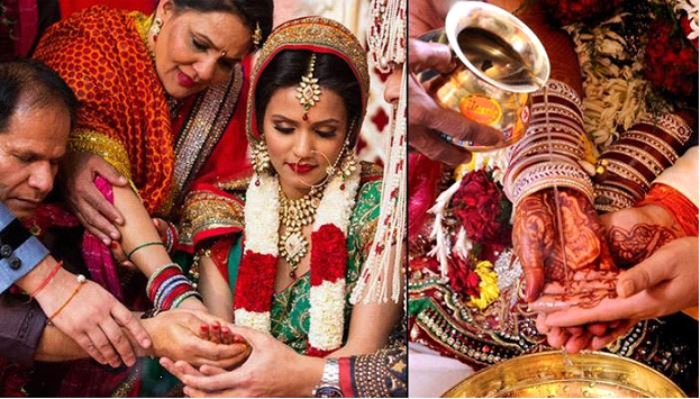
Why girls leave parents house after marriage. Meaning and significance of Kanyadaan
You may have heard some feminist and leftist saying "Why boys shouldn't leave their parent? Why only girls? Why to follow this unbiased outdated customs? Why to follow his patriarchal traditions? "blah blah blah. So, in this article, we will learn why wife leave their parents' house after marriage, not vice versa?
Check the below video for detailed graphical explanation of this article

In Hinduism, parents giving away their daughter to her prospective groom is done via the ceremony called Kanyadaan, meaning "Girl donation". Before, we understand rituals of Kanyadaan, let us first understand the meaning of Daan i.e Donation
Donation in Hinduism
Our ancient sages said that the more we give, the more we receive. It is only when the parents give their knowledge, their wealth, their values, and their time to the child, they receive an educated and well-respected child. Thus, donation in Hinduism is considered as the foundation of prosperity. Following are some types of Donation (Daan) mentioned in our scriptures:
Go-daan :- Cow Donation
Vidya-daan or jnana-daan (विद्यादान, ज्ञानदान): Sharing knowledge
Bhu-daan (भूदान):- Donation of land
Abhaya-daan (अभयदान): giving freedom from fear (asylum, protection)
Aushadha-daan (औषधदान): Taking care of the sick and diseased
Anna-daan (अन्नादान): Giving food to the needy
From above, you may have now understood that donation doesn't mean "favoring anyone". It is an act of doing your duty via circulation of wealth.
Moreover, Wealth in Hinduism does not necessarily mean only property, Money or jewelry. It means "Anything that is of Value to the Human Beings".
Daughter is considered as the most cherished wealth by parents as she is deeply rooted in the values of the family, is caring, is aware of various aspects of Life and at the same time, is fertile and has the potential to give birth to offspring and raise them
Now that we have understood donation, let us understand Kanyadaan
Once the parent gets old, they realize that they don't have the strength to manage and protect their wealth from goons, teasers, robbers etc. So, while they give up their monetary wealth to their sons, they give up their most cherished wealth i.e daughter to a groom who will respect her, take the best care of her, will protect her from all evils and will keep her happy in every way possible. This donation is done via the ceremony called Kanyadaan.
Kanyadaan is formed by joining two words. Kanya, meaning Daughter and daan, meaning Donate. In this ceremony, father takes a vow with lord agni (fire) as a witness that "Now I give my daughter to you (the groom) and that you become the man who has her now."
"I offer ye my daughter: A maiden virtuous, good natured, very wise, decked with ornaments to the best of my abilities, form of Lord Vishnu. With all that she shall guard thy Dharma, Wealth and Love."

As a symbol of acceptance, the groom first touches the feet of father and then, the right shoulder of the bride, promising to take care of her and holding her responsibility. From here, the transformation of ownership of the daughter begins, and henceforth, the husband is responsible for her well-being, and all her necessities.
"Where the female relations live in grief, the family soon wholly perishes; but that family where they are not unhappy ever prospers. The houses on which female relations, not being duly honored, pronounce a curse, perish completely, as if destroyed by magic. Hence men who seek (their own) welfare, should always honor women on holidays and festivals with (gifts of) ornaments, clothes and (dainty) food."- (Manu Smriti III-55-59)
Upon this transformation of ownership, she becomes the 'Goddess Lakshmi' form of 'the husband's house', and it is a ritual to take along 'their Goddess to his house' and keep her there for the prosperity of the house and family. Wife is seen as a queen who left her home at her own will to assist her consort whom she loves, The man who would not be able to walk a single step without her helping hand.
When a women is invited into the family through marriage, she enters "as a river enters the sea" and "to rule there along with her husband, as a queen over the other members of the family." - Atharva Veda ( 14.1.43-44 )
Kanyadaan is the most pious act for parents in hinduism
In Hinduism, groom is considered a form of Lord Vishnu. Thus, presenting him his daughter i.e goddess lakshmi is deemed as the most pious and dutiful act of the parents. It is believed that upon Kanyadaan, parents have given the optimum sacrifice and so, parents of the bride are absolved of all their earthly sins, and are said to attain moksha, relief from the cycle of birth, death and rebirth.
Having given away a maiden-daughter, decorated with ornaments, clothes and seats a father attains to the celestial region and is adored of the Suras (celestials . (64) (Samvarta Smriti)
For a wife, serving her husband is equal to staying at her Guru's house, doing the household duties at his residence is equal to the performance of Agnihotra etc.
VaivAhika vidhi strinAm samskaro vaidikah smritah |
PatisevA gurau vAsoh grihArtho agniparikriyA ||- Manu Smriti 2.67
The nuptial ceremony is stated to be the Vedic sacrament for women (and to be equal to the initiation), serving the husband (equivalent to) the residence in (the house of the) teacher, and the household duties (the same) as the (daily) worship of the sacred fire.
Other reasons why girl leaves parents, not boys
1) Naturally, girls are more suited to move into a new house than boys
To understand this, let us first understand how god had made men and women
Purush (Men) = Steady, constant, Tough, and Hard to adapt or change.
Stri (Women) = Easily adjustable, calm, caring Flexible
Anything that is calm, caring and flexible is termed a feminine entity. For Ex: mother Nature and mother Earth. As they serves us, care us and are flexible to adapt in all seasons and circumstances (flood, drought etc), they are given a feminine name

On the contrary, anything that is tough, inflexible is termed a masculine entity. For Ex: Mountain
Thus, as Boys are rigid, tough and inflexible, they can't adjust easily in a new environment. Whereas since women has a calm, flexible and caring nature, they can easily adjust in a new family. That is why ours scriptures came up with a tradition of wife going to her husband's home after marriage, and not vice versa. Out of the seven vows of marriage, in one vow bride promises that SHE WILL FOLLOW HER HUSBAND WHERE EVER HE GOES
2) In ancient days, work involved hard physical activities like farming, fighting wars, carpentry etc. Since Women's are physically weak compared to men especially during pregnancy, periods, delivery etc and can't work as freely as mens can, Women were considered fit for household chores that involved less effort while men did heavy outdoor work.
3) As only men used to work in olden days, quitting his job and finding a new job in the girl's location was very difficult and inconvenient. So, women had to move into men's house after marriage
4) Since olden days and even todays, girls have been soft-targets and need to be protected from eve-teasers, thugs, rapists etc. Till young age, father protect his girl. Then, father choose to gives this and other responsibilities to the groom via kanyadaan ceremony
Scriptures do mention boy leaving parents' house after marraige
In certain circumstances, the girl can continue to live with the parent if she has no brother and if she has the responsibility of the parent. Such a girl adopts the duties of a son and hence she is referred to as putrikA. She may choose to wed to a man who continues to live with her in her house.
This is mentioned in Mahabharata as
"That girl who has no brother nor father should not be wed, O chief of Bharata's race, for she may be intended as Putrika of her sire. 2 After the appearance of puberty, the girl (if not married) should wait for three years. On the fourth year, she should look for a husband herself (without waiting any longer for her kinsmen to select one for her). The offspring of such a girl do not lose their respectability, nor does union with such a girl become disgraceful. If, instead of selecting a husband for herself, she acts otherwise, she incurs the reproach of Prajapati herself. One should wed that girl who is not a Sapinda of one's mother or of the same Gotra with one's father"- Mahabharata Shanti Parva SECTION XLIV

Conclusion:-
Thus, wife move into husband house after marriage as a newly married girl coming into a household is seen as a purifying force, a demi-goddess who will raise her husband's family to greater heights of dharma. Women are the real head-of-the-families in India. All the major decisions regarding the household and life are taken by the women. So, she is like a high-profile CEO brought on board from an already successful company i.e parent house to repeat the success in a new company i.e husband house
Note: Images used on this website
are either a production of Bhaktivedanta Book Trust(https://www.krishna.com), Iskcon
Foundation or were found in google search under "Free to use and share". If any
of the images presented here violates copyright issues or infringes anyone copyright
or are not under "Fair use", then please bring it to our notice. Read
Disclaimer for more.
Share this to your friends. One of your friend is
waiting for your share.
Related Articles
How homosexuality is unnatural
Post Comment